MINNEAPOLIS — Four years ago, Frank Schubert was a well-paid political consultant for what he jokingly calls “the forces of evil” — tobacco, timber and pharmaceutical companies — when he agreed to lead the 2008 campaign to repeal gay marriage in California.
What started as a professional challenge has now become a personal crusade. And Schubert, a specialist in political messaging, has become the central figure in a major effort to stop gay marriage from becoming legal in Maine and across the country.
Part Karl Rove and part Pat Robertson, Schubert is managing four statewide campaigns where the issue is on the ballot in the fall — in Maine, Maryland, Minnesota and Washington. He’s trying to preserve a winning streak in which conservatives have put anti-gay marriage laws on the books in 32 states in the past decade.
In 2009, Schubert led the campaign that overturned Maine’s gay marriage law, 53 percent to 47 percent, and unseated three Iowa Supreme Court justices who ruled gay marriage legal in that state. Earlier this year, he engineered passage of North Carolina’s gay marriage ban.
Schubert and fellow political consultant Jeff Flint came up with what many believe was the argument that led to the gay marriage law being overturned in Maine: If it’s approved, children will be taught homosexuality in school.
Critics assailed the messages as misleading fear-mongering, but the tactic has become a hallmark of successful anti-gay marriage campaigns around the country.
But some national polls show public opinion gradually shifting toward accepting gay marriage. A poll commissioned by the Portland Press Herald and released last week had 57 percent of respondents supporting same-sex marriage rights and 35 percent opposing them. Eight states allow same-sex marriage.
Schubert said his mission is to make voters understand what’s at stake.
“Five thousand years have shown that marriage between a man and a woman serves us well,” he said, adding that it is “fundamental to our nature as people.”
The alternative, he said, is a culture based on personal desires.
The initiatives this year will feature a collision of well-funded organizations and media efforts as sophisticated as any national political campaign. The National Organization for Marriage, a Washington-based nonprofit supported by conservative donors, is funding Schubert’s effort. Gay rights groups and backers are heavily invested on the other side. The opposing forces are expected to spend up to $20 million in Minnesota alone.
The campaigns will provide a new test of the competing messages about the contentious issue: Do gays deserve the same right to marry as heterosexuals? Or should society allow children to grow up in an environment in which same-sex marriage is a viable life choice?
Schubert deftly targets the latter message at parents.
“That’s a major argument for us, that whenever people have gone to the polls, they’ve voted our way,” Schubert said this week during a two-day visit to Minnesota to check in on the campaign there.
Gay rights organizers begrudgingly admire Schubert’s ability as much as they detest what he’s doing.
“Whether we like it or not, he’s done a very good job of tapping into fears people have about homosexuality that are still very real,” said Julie Davis, a San Francisco-based GLBT activist.
For Schubert, a stocky, white-bearded 56-year-old, the cause has been a perfect union of his professional background and personal values.
Earlier this year, Schubert gave up the 15-member consulting firm he co-founded in California, which he said billed $2.5 million in a slow year, to become a one-man shop in a field that is “far less lucrative.” But he said his work “has deepened my own faith, deepened my own marriage.”
He said not everyone understands his choice, even in his own family. Schubert has a younger sister raising children with her lesbian partner.
“I love my sister very much, and I wanted her to know that my working on this issue was not a reflection of me seeing her as a less valuable person,” he said.
Anne Marie Schubert, a Sacramento County prosecutor, declined to be interviewed.
Schubert’s campaigns use TV ads to drive home a message about gay marriage’s “consequences.” A typical ad in California showed a young girl running up to her mother: “Mom, guess what I learned in school today? I learned how a prince can marry a prince, and I can marry a princess!” Then, cut to a conservative law professor: “Think it can’t happen? It already has.”
The oldest of eight children, Schubert grew up in Sacramento and attended an all-male Jesuit high school. His first marriage ended after nine years and two children; he had it annulled. His deepening Roman Catholic convictions, he said, helped him make a better second marriage and support one of his daughters in overcoming addiction problems.
In addition to his work on gay marriage, Schubert says he also hopes to pursue state laws to make divorce more difficult.
Schubert spends his time leading staff strategy meetings and stopping at Christian radio stations, always leaving time to pray a daily rosary.
He says he’s confident about winning in all four campaigns this year but admits to not knowing where public attitudes on gay marriage will be in a decade or two.
“I think it’s very much an open question,” he said.
Send questions/comments to the editors.


